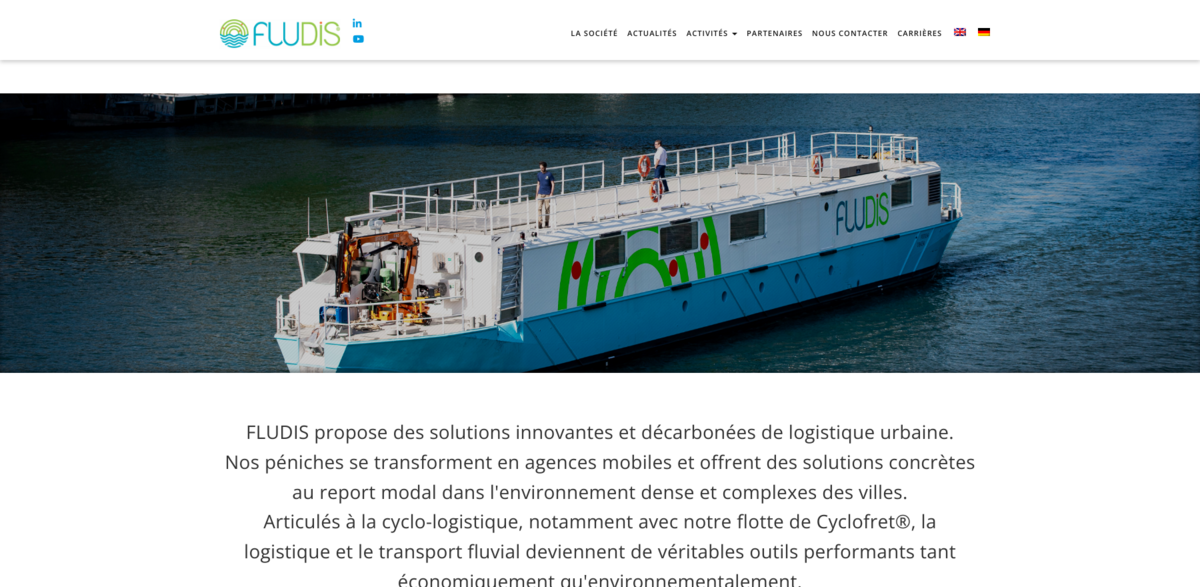What is FLUDIS?
FLUDIS is shaking up urban logistics with innovative, carbon-free solutions. Imagine barges transformed into mobile agencies, cruising through dense city environments to tackle the challenges of parcel delivery and collection. These floating platforms work hand in hand with a fleet of Cyclofret® cargo bikes, blending river transport with cyclo-logistics. The result? A smart, eco-friendly way to move goods that’s not only good for the planet but also economically savvy. By using waterways as a backbone and light electric vehicles for last-mile delivery, FLUDIS offers a fresh take on urban logistics that cuts through the usual congestion and pollution.
Main Benefits of FLUDIS
Here’s why FLUDIS stands out:
- Reduces at least 300,000 km annually driven by light commercial vehicles, slashing emissions by about 110 tonnes of CO2 each year.
- Combines river transport with cyclo-logistics, making deliveries more flexible and efficient in crowded urban areas.
- Addresses the growing distance of messaging warehouses from city centers—like the 15 km increase around Paris over 15 years—by bringing logistics closer to recipients.
- Supports sustainable urban development by easing road congestion and lowering noise and air pollution.
- Employs full-time operational teams, including bike couriers, promoting social responsibility and new job opportunities.
How FLUDIS Tackles Urban Congestion
Urban areas are bursting at the seams with fossil-fuel-powered vehicles clogging roads, especially during rush hours. This not only slows down parcel deliveries but also pumps out harmful air and noise pollution. FLUDIS flips the script by using rivers as natural highways. Barges ferry cargo to strategic points, where light electric vehicles take over for the final leg. This clever setup reduces the number of delivery vans on the streets, easing traffic jams and making the whole system more efficient. Plus, it’s a smart way to deal with the tricky real estate issues that come with urban logistics.
FLUDIS and Sustainable Urban Development
At its core, FLUDIS is about more than just moving parcels—it’s about creating a sustainable future for cities. By shifting from traditional road-based logistics to underused waterways and “positively undersized” urban vehicles like cargo bikes, FLUDIS is pioneering a virtuous cycle. This approach not only cuts emissions but also supports a flexible and resilient logistics network. It’s a win-win for businesses, city dwellers, and the environment alike.
The Role of Cyclo-Logistics in FLUDIS’ Model
Cyclo-logistics is a game changer here. The Cyclofret® fleet of cargo bikes plays a crucial role in bridging the gap between river platforms and final delivery points. These bikes zip through city streets with ease, avoiding traffic snarls and reducing noise pollution. Their smaller size and electric assistance make them perfect for navigating tight urban spaces, ensuring parcels get where they need to go quickly and quietly. This combination of waterborne transport and bike delivery is a fresh, dynamic way to rethink last-mile logistics.
FLUDIS’ Contribution to Global Sustainability Goals
- SDG 9: Industry, Innovation, and Infrastructure – by innovating urban logistics infrastructure.
- SDG 11: Sustainable Cities and Communities – by reducing urban congestion and pollution.
- SDG 12: Responsible Consumption and Production – through efficient resource use and modal shift.
- SDG 13: Climate Action – by cutting CO2 emissions significantly.
- SDG 8: Decent Work and Economic Growth – by creating stable jobs in emerging green sectors.
FLUDIS’ Vision for the Future of Urban Logistics
Looking ahead, FLUDIS aims to keep pushing the boundaries of what’s possible in urban logistics. By blending river transport with cutting-edge cyclo-logistics, it’s setting a new standard for efficiency, sustainability, and social responsibility. The model shows how cities can rethink their transport networks, reduce their environmental footprint, and improve quality of life—all while keeping goods moving smoothly. It’s a glimpse into the future of urban delivery, where innovation meets real-world challenges head-on.





















